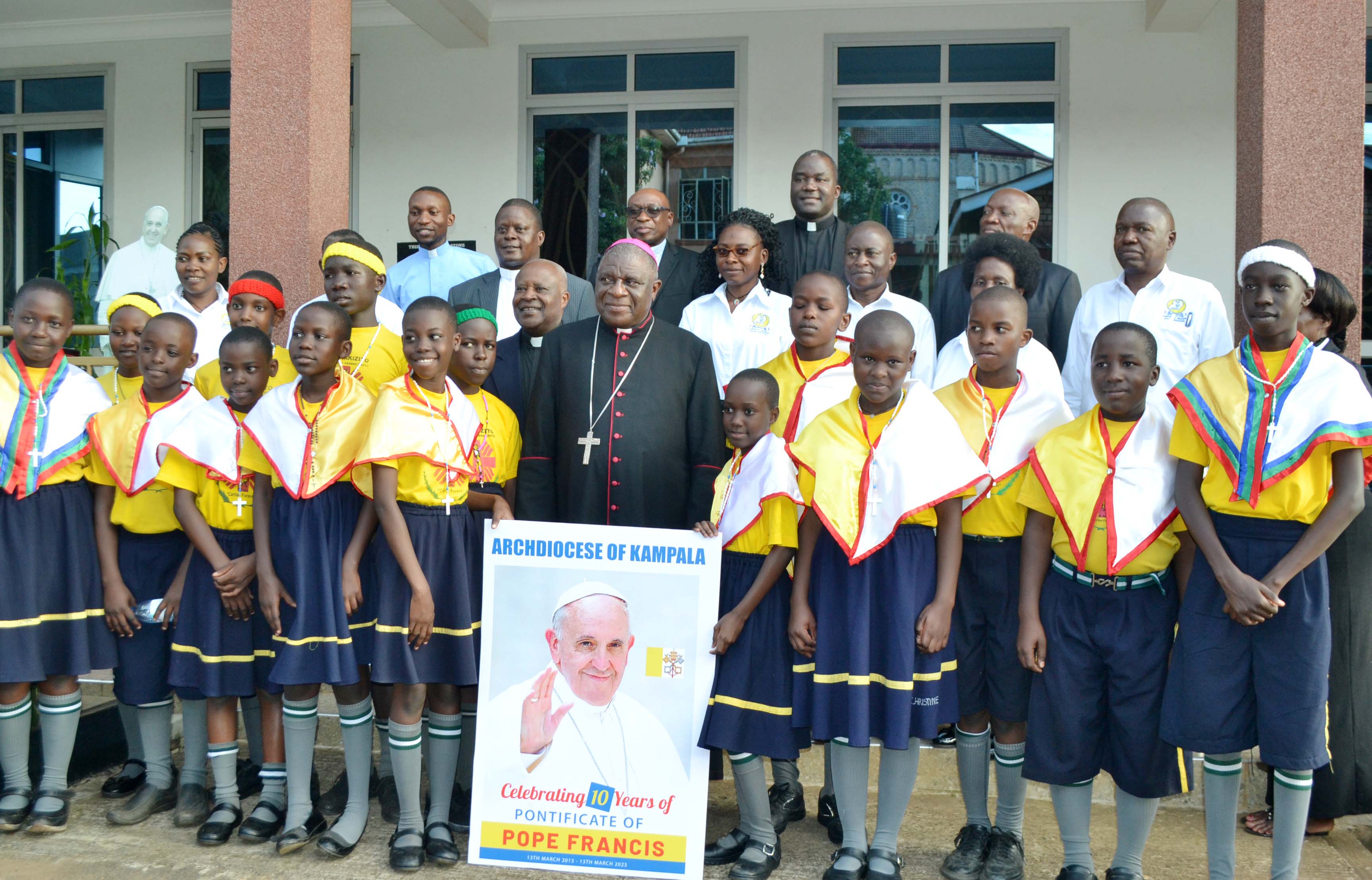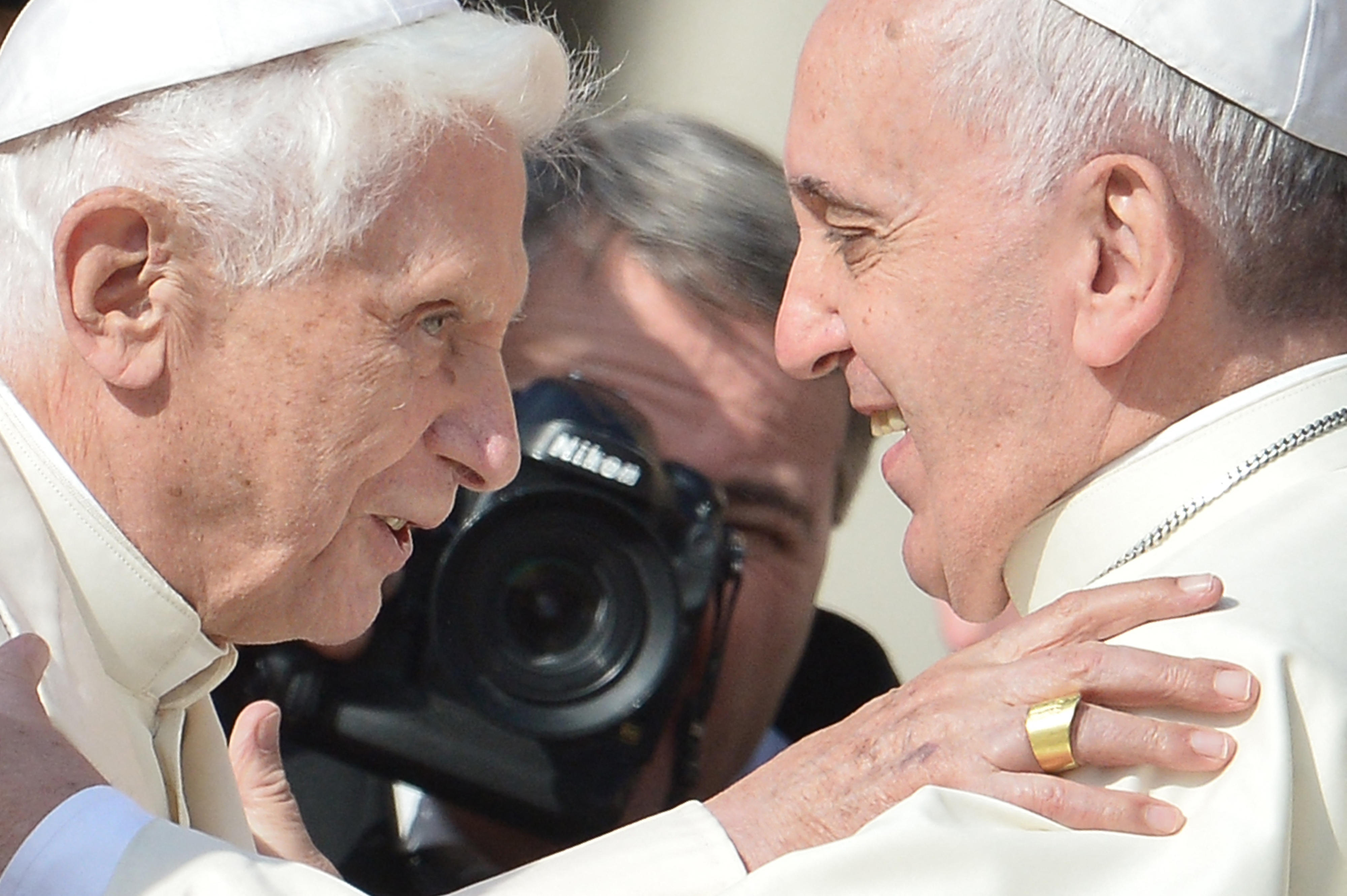Prime
Seven dynamics that define Pope Francis

Pupils of St Peter’s Primary School Nsambya, flank Archbishop Paul Ssemogerere at arecent celebration of Pope Francis’s 10th anniversary as Pope. PHOTO/ SYLIVIA KATUSHABE.
What you need to know:
- Pope Francis has spent 10 years as a pointiff, what dynamics explain what he stands for?
Pope Francis was elected as the 266th Pope in the history of the Catholic Church in 2013. On March 19, 2013 he inaugurated his Pontificate choosing the motto “Miserando atque eligendo” translated as by feeling/showing mercy” and “by choosing.”
On March 13, Pope Francis marked 10 years as a supreme pontiff of the holy Catholic Church and recently the Archdiocese of Kampala celebrated his anniversary hosted by the Archbishop Paul Ssemogerere. The archbishop said for the last 10 years the Pope has impacted the church with over trolling of the code of canon law.
Archbishop Ssemogerere explained that the aim of the event was a reflection of the pontificate of Pope Francis to present his portrait as the inferable teacher of the Catholic faith.
There, Fr Prof Emmanuel Katongole, a professor of Theology and Peace Studies at the Kroc Institute of International Peace Studies at the University of Notre Dame, through his keynote address noted that Pope Francis is always understood with snippets that people get from the media, gestures and statements but they do not have the full picture of him.
Thus, he went ahead to explain the seven key dynamics which he feels explain who Pope Francis is.
1 God’s Mercy
“In 1953, when he was 17 years old, he stopped at a parish and found that priest he did not know and asked for confession. Five minutes later, because he wanted to be a chemist out of the five minutes he decided to be a priest,” Prof Katongole said.
God had been waiting for him to fill him with mercy and to invite him to be a minister of God’s Mercy by becoming a priest.
“This is what explains the motto that he chose when he was elected the supreme pontiff. Which translated into God having had mercy on him, He chose him,” Fr Prof Katongole said. He added that Pope Francis constantly reminds believers that God never tires of forgiving.
2 Joy
Soon after being elected as pope, Pope Francis wrote the first an apostolic exhortion, a book titled The Joy of the Gospel in 2013. Here Pope Francis set out his vision and tone for Christian life.
“The gospel always radiates the glory of the Christian growth and constantly invites them to rejoice,” Prof Fr Katongole said.
Herein, Pope Francis encourages everyone to evangelise the gospel of joy and also not to allow themselves to be robbed of the joyful gospel. Prof Fr Katongole elaborated that Pope Francis also invites everyone to encounter that tenderness and mercy of God, and once they do, it radiates joy.
“Let us not allow anything rob us of that joy that comes from joy,” Prof Katongole said.
3 Attention to the poor, refugees, elderly and migrants
According to Pope Francis, this is where the mercy of God needs to be felt in a special way. The vulnerable such as the poor, orphans,widows, and elderly are the key to God’s heart.
“God’s heart has a special place for the poor, for He himself became poor, he has a special place for them,” Prof Katongole quotes the Pope.
Prof Katongole explained that the first holy week in April, the year he was elected, Pope Francis visited a women’s prison in Roma and washed their feet including one Muslim woman. This also explains why the first trip he made out of the Vatican in July of the same year, he visited a small Island on the Mediterranean Sea where many migrants wash up and many die.
“That is why he transformed the 19th Century Palazzo that was a province into a home of the homeless to invite them into the heart of the church because tenderness begins at the margins and those that are excluded,” Prof Katongole said.
4 His vision for the church
The Church, Pope Francis says, ought to be a sign and sacrament of God’s Mercy. This is why he writes that “I prefer a church that is bruised, dirty because it has been on the streets rather than a church which is unhealthy from captivity clinking its security. The Pope also explains church as a field hospital, and an ambulance after the bath.
“You have to treat wounds of those wounded ,” he says.
“Pope Francis also talks about a healthy decertification that the church is not Roma or Rubaga but it is at the grass roots where people are,” Prof Fr Katongole said.
5 Solidarity
Prof Fr Katongole noted that it is solidarity that explains Pope Francis’s constant remarks to what he describes as runaway capitalism that continues to create a big gap between the poor and the rich.
Pope Francis pronounced this during the Covid-19 years and a number of times he said that we must dream of the new future, economics that does not create a gap between the rich and the poor.
“He wrote that solidarity is not a question of helping others who need, yes we need to help them but it is a matter of justice,” Prof Fr Katongole explained.
6 Nonviolence
Pope Francis constantly reminds us that violence is an unacceptable as a way of solving our problems. Violence destroys humanity while non-violence is a form of engagement and way of responding to evil with dialogue.
“This explains why in 2019, he kissed the feet of the president and deputy president of Sudan that were fighting. He visited DR Congo and he constantly prays and makes statements on the Ukraine and Russia war,” Fr Prof Katongole noted.
Did you know?
7 Love and care for creation
Pope Francis argues that mother Earth is carrying the burden of environmental pollution, destruction, loss of biodiversity, mining and deforestation. He explains that we have forgotten what it means that we are all created by God and deeply connected with everything else. The pope always says we have a responsibility to respond to the cry of Earth and we need not just a technical solution but a mindset change.




